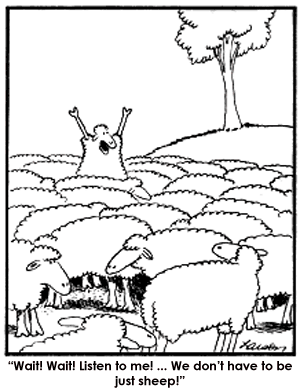It takes courage to truly think differently. It's our natural human tendency to want to belong to a group; we're social beings after all. We're affected in so many ways as members of the groups we belong to, and some not so good for us or the group. As the pull of the group gains strength, it becomes harder for individuals within it to think differently- enter groupthink.
I used to chuckle a few years ago when it was very popular for teens to dye their hair straw blond, you know, like Eminem did. Every time I casually asked these kids why they did that the response was identical... "I want to be different." A quick peek down the corridor of the local mall on any given day during that time revealed literally hundreds of kids with dyed blond hair. I witnessed the same phenomena during my undergrad studies when the grunge-rock scene was pumping out of Seattle at breakneck speed. A glance through any library on campus revealed dozens, if not hundreds depending on the library, of young people being "individuals" by looking exactly like Kurt Cobain in their tattered dress and knotted-up long hair, not having showered for a few days. I'm going to call this mentality fad-eology; a portmanteau meaning a fad that becomes an ideology for the masses of group-thinkers who jump on the bandwagon. We are undeniably and ironically influenced by groupthink on our quest to be "different."
Although it's easy to understand how groupthink happens, and the examples I mentioned are rather harmless to be sure, groupthink can become complex and rather dangerous. Let's say an original and good idea was the source of whatever concept the group is espousing, and it's spread like wildfire. Over time, and amidst the fervor of the growing group and it's idea, scrutiny toward the idea wanes and members cease to be individuals with their own thoughts and perspectives toward it. They are now "idea-assimilated." I'm not sure the original idea can be considered original and good (different) anymore, (in context meaning open, critical and fluid- not static and closed.)
In education we need open, critical and fluid thinking. When once radical positive ideas become mainstream as a result of groupthink influence, the scrutiny is lost and those who dare defy the inertia of the group's idea are shunned and criticized as non-reformist. Hey, let's face it, when compared to groupthink, sometimes doing things conservatively is the most innovative just because so few are willing to acknowledge within the group that their desire for change has clouded their ability to think independently about the original issue- they become "change-addicts" lost in the fervor of the group and blind to the grassroots seed of the issue needing to evolve.
I accept that I will be criticized for my stance on this. I have seldom been caught in the web of groupthink. I question, therefore I am, and that doesn't sit well among group-thinkers. However, those who are willing to receive my questions and thought contributions objectively as I intend them to be more often than not perceive that my motivation stems from a desire to contribute to the improvement of public education, a cause of great importance requiring careful thought. Public education is too important to be influenced by groupthink. Any move to improve the education system should always and without bias be open to the scrutiny of independent thinkers ready to challenge thought, even if this challenge is dare I say, the unpopular and minority point of view.
So my appeal to educators far and wide is to become more open to scrutiny of ideas, especially fad-eology ideas. We need to think differently and objectively, perhaps even more scientifically about improving education. Twitter is such a great forum for broad conversation, so in the interest of creating open dialog around the need for critical and creative thought within the education reform process, why not use the hashtag #thinkdifferently to promote dialog contrary to fad-eology. One group with a hundred thoughts is better than a group of one hundred with one thought.



